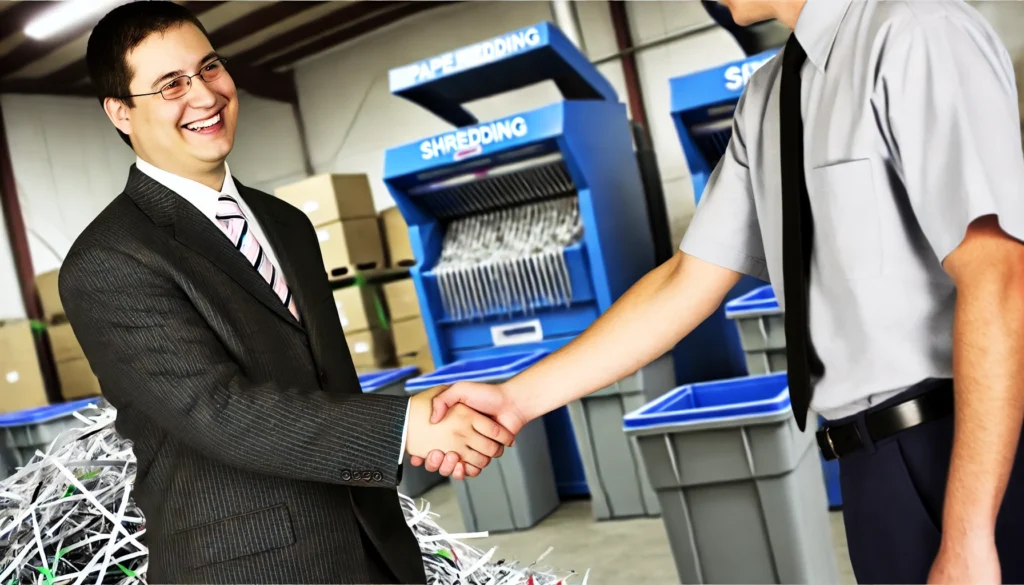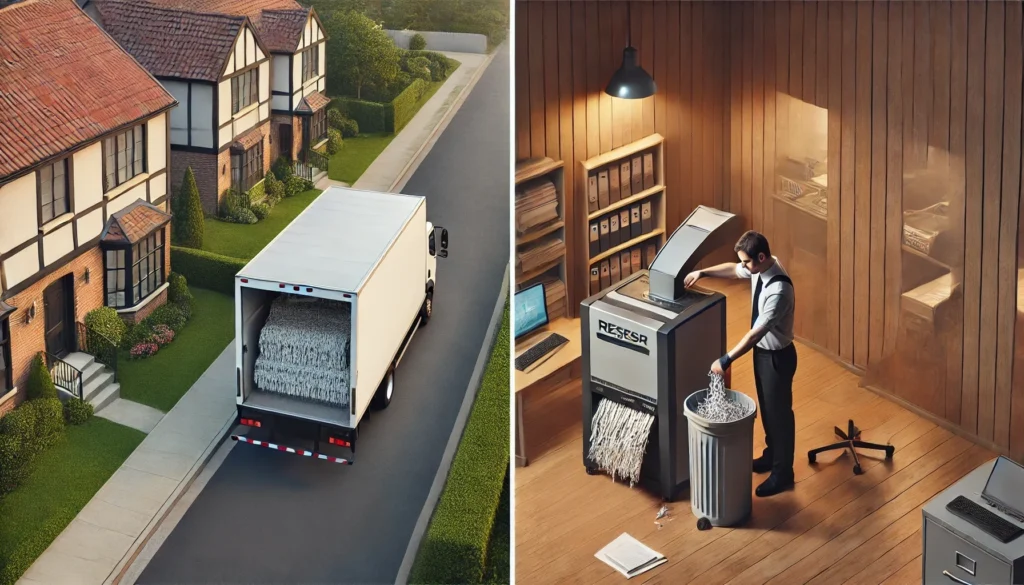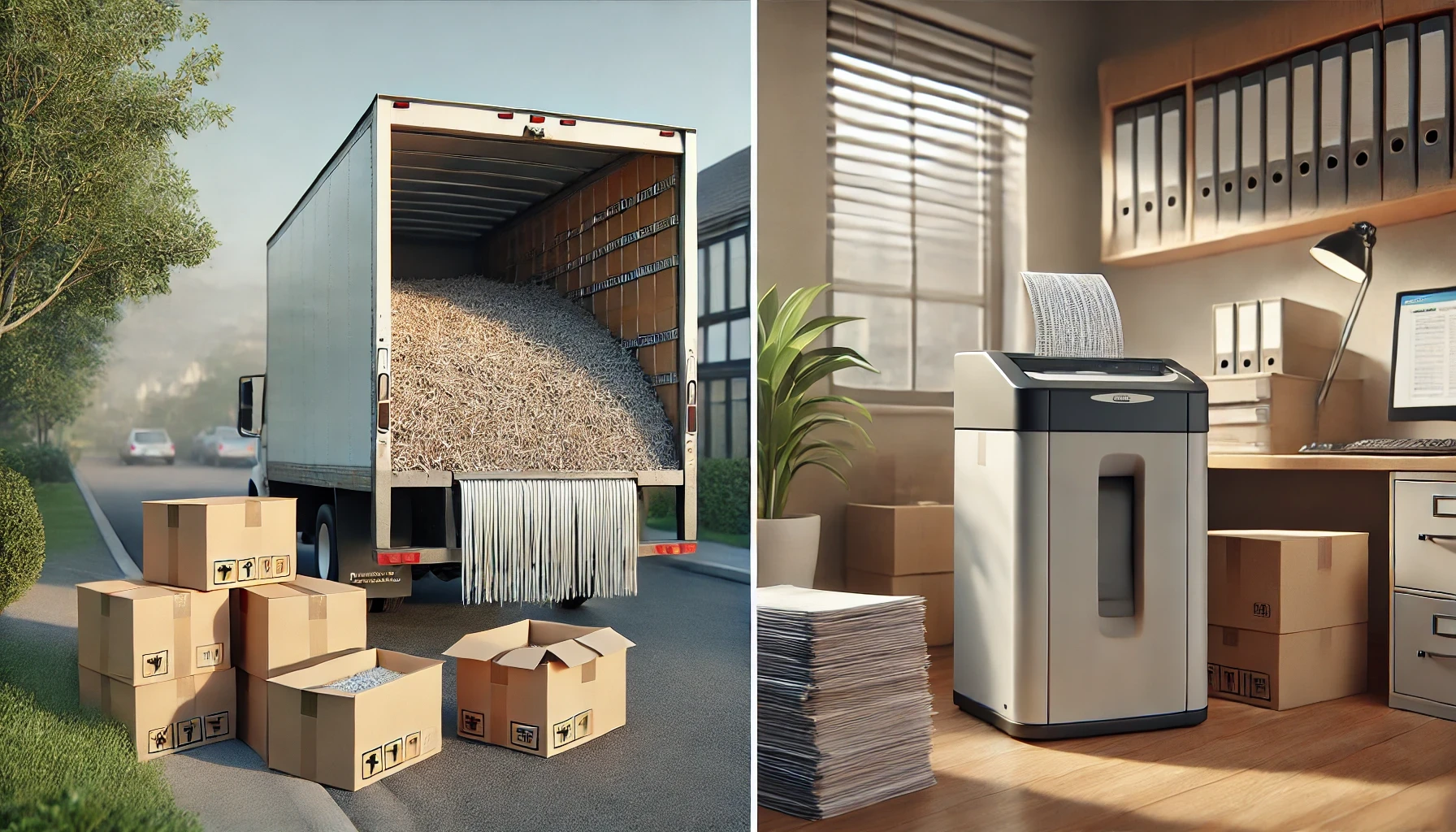With sensitive data increasingly at risk, protecting your personal information has never been more essential.
Whether you’re working from home or managing an office, proper shredding practices offer a crucial layer of defense against identity theft and data breaches.
This comprehensive guide dives deep into the best practices for secure shredding, outlining the distinct benefits for both residential and business settings.
From essential tips on what to shred to a detailed look at how to choose the right shredding service, we weigh the pros and cons of each option to help you make a safe, informed decision.
What is Shredding?

Shredding is a critical process of document destruction that ensures data protection and confidentiality for both individuals and organisations. It involves the systematic destruction of paper documents, files, and other sensitive materials to prevent identity theft and unauthorised access to personal information. This essential service not only enhances security but also promotes eco-friendly practices through the recycling of shredded materials.
As concerns regarding data breaches continue to escalate, it is increasingly important to understand the significance of shredding and its various methods for maintaining peace of mind in both residential and corporate settings.
By utilising shredders that comply with industry standards, organisations can protect themselves against potential data leaks that may result in serious financial and reputational harm. Secure disposal methods are critical, as they not only adhere to legal regulations but also demonstrate a commitment to responsible data management.
When documents are shredded, the amount of waste sent to landfills is significantly reduced, aligning with environmentally sustainable practices. This dual focus on security and ecological responsibility positions shredding as an essential component of an effective and modern data protection strategy.
Residential Shredding
Residential shredding is a vital service designed for individuals seeking to protect their personal data and ensure privacy within their homes. Given the rising threat of identity theft, homeowners are increasingly acknowledging the necessity for reliable shredding solutions that combine convenience with security.
This service guarantees the effective destruction of sensitive documents, such as bank statements and medical records, thereby providing peace of mind and ensuring compliance with local regulations.
By understanding the available options, including scheduled and one-off shredding, individuals can select the most appropriate method tailored to their residential requirements.
Benefits and Considerations for Home Use
The advantages of residential shredding extend well beyond simple document disposal, providing homeowners with peace of mind, convenience, and compliance with data protection regulations. By employing shredding solutions—such as user-friendly shredders or local shredding services—individuals can effectively manage the accumulation of paper within their households.
This proactive approach not only streamlines the process of eliminating unnecessary clutter but also ensures that sensitive information is securely destroyed, thereby reducing the risk of identity theft.
Homeowners have a range of shredding options available to them, from personal shredders for occasional use to regular service contracts with professionals for ongoing needs.
This flexibility enables individuals to maintain organisation while also prioritising cost-effectiveness; many find that the peace of mind gained significantly outweighs the initial investment.
Furthermore, these practices contribute to a sustainable environment, as shredded paper is frequently recycled, thereby promoting responsible environmental stewardship.
Office Shredding

Office shredding is an essential component of commercial shredding practices that ensures the confidentiality of sensitive business information. As organisations increasingly acknowledge the importance of data protection regulations, they recognise the necessity of implementing effective shredding services to guard against data breaches and identity theft.
By utilising either on-site shredding or shredding machines within the workplace, companies can enhance their shredding security measures. It is crucial to understand the implications of non-compliance and the significance of shredding policies in maintaining a responsible corporate environment.
Advantages and Disadvantages for Businesses
Understanding the advantages and disadvantages of office shredding is crucial for businesses when making informed decisions regarding shredding services. The advantages encompass enhanced security for sensitive documents, compliance with shredding regulations, and the convenience of selecting either on-site or off-site shredding options.
Factors such as shredding costs and service flexibility can significantly influence how organisations manage their shredding needs. It is also essential for companies to consider customer reviews and feedback to assess the effectiveness and reliability of their chosen shredding solutions.
Evaluating these aspects enables businesses to examine not only the financial implications of shredding but also the potential effects on their operational efficiency. Enhanced security measures provided by professional shredding services can mitigate the risks of data breaches, thereby fostering a trustworthy environment for clients and stakeholders.
Conversely, organisations may encounter challenges if high shredding costs strain limited budgets, which may prompt them to explore more affordable alternatives.
While service flexibility is a notable advantage, it may also lead to confusion if organisations are unable to adjust their shredding schedules in response to changing demands, highlighting the importance of selecting a service provider with care.
Factors to Consider when Choosing a Shredding Service

When selecting a shredding service, it is imperative to consider several factors to achieve an optimal balance between security, convenience, and cost-effectiveness.
Evaluating the level of shredding security provided by the service provider is essential, along with ensuring compliance with local shredding regulations and certifications. Furthermore, a thorough understanding of shredding costs and the flexibility of scheduling can greatly influence the overall efficiency of document destruction.
Both businesses and individuals should carefully assess their specific shredding requirements and the volume of paper needing disposal in order to identify the most appropriate shredding solutions.
Security, Convenience, and Cost
Security, convenience, and cost constitute the three fundamental pillars of a reliable shredding service, and understanding their interrelationship is essential for making well-informed decisions.
When evaluating the offerings of different providers, it is important to explore how these elements work in tandem. For instance, robust security measures in shredding not only safeguard sensitive information but also foster trust in the service, enabling clients to feel confident in their choice.
Additionally, the convenience factor plays a significant role in customer experience, particularly in situations involving emergency shredding needs or the scheduling of regular collections.
By thoroughly assessing the overall costs associated with shredding services, including potential additional charges, customers can better understand the value associated with various options. Ultimately, the convergence of these factors influences the efficacy of a shredding service, guiding users towards a solution that effectively addresses their specific requirements.
Comparing Residential and Office Shredding

A comparison of residential and office shredding reveals distinct advantages and disadvantages for each option, underscoring the unique shredding solutions tailored for individuals and businesses.
Residential shredding prioritises personal data protection, providing convenient and user-friendly shredders to ensure the secure disposal of sensitive documents. In contrast, office shredding addresses the complexities associated with commercial shredding needs, emphasising efficiency and compliance with applicable regulations.
Understanding these differences is crucial for making an informed decision between the two, particularly regarding security, cost, and available shredding alternatives.
Pros and Cons of Each Option
The advantages and disadvantages of residential and office shredding underscore the particular benefits and challenges associated with each option.
In the context of residential shredding, individuals can conveniently dispose of sensitive documents, thereby promoting peace of mind regarding identity theft. However, they may face challenges related to the accumulation of paper over time, necessitating more frequent shredding sessions.
Conversely, office shredding offers comprehensive protection of confidential information, ensuring alignment with regulatory compliance. Nonetheless, businesses may experience difficulties such as coordinating schedules and managing the costs associated with bulk shredding services.
Evaluating these various factors enables a well-informed decision regarding the adoption of the most appropriate shredding approach, tailored to the specific needs of each situation.
Frequently Asked Questions
What is the difference between residential shredding and office shredding?
Residential shredding refers to the destruction of personal documents at a person’s home, while office shredding involves the destruction of documents at a business or organisation’s office location.
Which option is more secure: residential shredding or office shredding?
Both residential and office shredding can be equally secure if proper procedures are followed. However, office shredding may offer an extra layer of security as it can be monitored by designated personnel.
Can I use the same shredder for both residential and office shredding?
While it is possible to use the same shredder for both residential and office shredding, it is not recommended. Office shredders are typically more heavy-duty and designed for high volume shredding, while residential shredders may not be able to handle the same workload.
Is there a difference in cost between residential shredding and office shredding?
The cost of shredding services may vary depending on the provider and the amount of documents being shredded. However, in general, office shredding may be more expensive due to the higher volume of documents being shredded.
Are there any regulations or laws that apply to residential and office shredding?
Yes, both residential and office shredding may be subject to privacy laws such as HIPAA and FACTA. It is important to research and follow these regulations to ensure the proper handling and destruction of sensitive information.
Which option is more convenient: residential shredding or office shredding?
This may vary depending on individual circumstances. For individuals who have a large amount of personal documents to shred, residential shredding may be more convenient as it can be done at home. On the other hand, businesses with a high volume of documents may find office shredding to be more convenient as it can be done on-site and may save time and resources.

